The stripped-down Model A Raspberry Pi now available in Europe
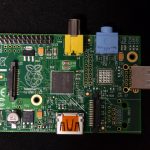
The Model B Raspberry Pi is hardly expensive, costing just $35 (plus local taxes and shipping/handling fees). But if that’s a little too much for you, or you don’t need fancy features like Ethernet, and 256MB of RAM sounds more than adequate, you can now get your hands on the Model A Raspberry Pi for a bargain $10 cheaper.
Available from Premier Farnell/Element 14 and RS Components, the Model A version of the popular credit card-sized ARM GNU/Linux computer will cost just $25. Although it’s currently only available in Europe, it will be rolling out to the rest of the world shortly. If you live in the US you can pre-order one, but there will be a slight delay before the order can be fulfilled.
Google donates 15,000 Raspberry Pi microcomputers to UK schools
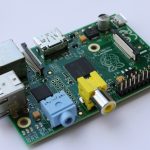
Although the Raspberry Pi was originally aimed at encouraging school children to learn to program as they did in 1980s and 90s, the affordable credit card-sized ARM GNU/Linux computer has actually ended up appealing to a broad range of ages.
The Raspberry Pi Foundation has never lost sight of its initial purpose though, and thanks to the generosity of Google, it’s about to make some serious headway into British schools.
Turn a Raspberry Pi into the ultimate emulator

Raspberry Pi, the popular credit card-sized ARM GNU/Linux computer, is a real throwback to the past. It was conceived as a low-cost way of encouraging people to get back into programming, as they did in the 80s and 90s, and it’s even possible to program it using the venerable BBC basic.
RPI Chameleon, a great new project from Carles Oriol, enhances the Pi’s time machine like quality, by letting it run emulators for a whole batch of ancient hardware, including the IBM Personal Computer, Atari 2600, Apple II, ZX81, ZX Spectrum, Commodore 64, and Oric-1. It can even run MAME, the arcade emulator, and you can add additional emulators to its menu too.
Raspberry Pi launches its own app store
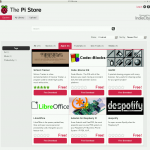
The maker of the popular credit card-sized ARM GNU/Linux computer has launched an online store to enable developers to share their games, applications, and tutorials with other Raspberry Pi users. The device was originally conceived as a way of encouraging youngsters to get into programming, and the store will provide a place for them, and older developers, to share their creations and maybe make a little money at the same time.
At launch the store has 23 free titles, and a paid game (Storm in a Teacup which is priced at £1.99/$3.22). The free content includes utilities such as LibreOffice and Despotify (an open source Spotify client) and classic games including Freeciv and OpenTTD. There’s also an exclusive 3D multiplayer space combat game called Iridium Rising. Winners of the Raspberry Pi Summer Programming Contest are being encouraged to upload their entries to the store, too.
Minecraft is coming to the Raspberry Pi
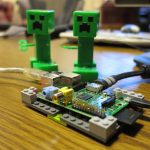
A port of the incredibly popular indie sandbox survival game Minecraft will soon be available for the Raspberry Pi, and if that news isn’t enough to get you excited, the price might -- it will be entirely free.
Minecraft: Pi Edition (a port of Minecraft: Pocket Edition) was officially unveiled at Minecon in Paris, and offers a revised feature set and support for several programming languages, so users can code directly into the game. According to Minecraft publisher Mojang, users will be able to "start by building structures in the traditional Minecraft way, but once you’ve got to grips with the in-game features, there’s opportunity to break open the code and use programming language to manipulate things in the game world. You’ll be learning new skills through Minecraft".
RISC OS comes to Raspberry Pi
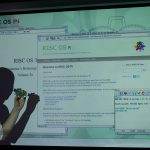
Raspberry Pi is, in many ways, a throwback to the past and not just in terms of performance. The uncased single-board ARM GNU/Linux computer was originally conceived as a way to get students programming again, like they did back in the 1980s and 90s, and now there’s even a 25 year-old OS available for it.
RISC OS is an operating system you’ll possibly be familiar with if you’re of a certain age, and come from the United Kingdom (like me). A descendant of the OS used in the BBC Micro, it was created by Acorn Computers for the First Reduced Instruction Set Computing (RISC) ARM chips, and made its debut in Acorn's 1987 Archimedes microcomputer.
Raspberry Pi SoC drivers open sourced
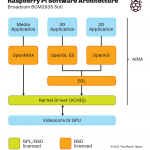
It’s something that programmers of the popular credit card-sized ARM GNU/Linux box have been asking after for a while now, and finally that wish has come true. Broadcom has agreed to make its mobile GPU drivers open source, releasing them under a 3-Clause BSD license.
What that means for developers, is it will now be much easier to implement Wayland EGL client and server support, and allow anyone attempting to port a different OS to Raspberry Pi to take full advantage of the graphics core.
Raspberry Pi adds more RAM, keeps price the same

Raspberry Pi, the massively popular credit-card-sized computer, has had a surprising update -- the Model B version will now come with 512MB of RAM as standard, but will remain priced at $35.
If you’re not familiar with the device, it’s essentially a bare, single-board uncased ARM GNU/Linux computer that you connect to your TV and a keyboard. It’s designed to encourage programming and while aimed at children and students has proved a hit with all age groups, and has been put to some great uses, including sending back photos from the edge of space.
Raspberry Pi not enough for you? How about a $49 Android PC?
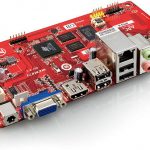
Taiwanese fabless semiconductor company Via Technologies on Tuesday unveiled its affordable, low power Android PC system, known simply as APC.
The $49 board uses the Neo-ITX form factor, which at 170 x 85 millimeters is the same length as Mini-ITX, but half as wide. It is powered by the VIA WonderMedia ARM 11 system on a chip, which is equipped with an 800MHz processor, 512 MB of DDR3 RAM, and has integrated GPU capable of video outputs up to 720p in resolution. It also has 2GB of NAND Flash storage, HDMI and VGA ports, four USB 2.0 ports, 1/8" headphone jack and mic input, microSD slot, and 10/100 Ethernet connectivity. The whole thing runs off of a 15 W power supply and is loaded with a version of Android 2.3 optimized for keyboard and mouse input.
Much like the wildly popular Raspberry Pi project PC which debuted last February, the APC is meant to be a "technology enabler" more than a powerhouse for computing. The board gives users with few resources the ability to build a cheap, usable computer without having to roll in the superfluous features associated with full-scale desktop OS computing.
Android-based Orange Pi OS brings Windows 11's look and feel to Orange Pi computers
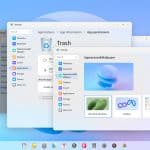
Orange Pi is an affordable alternative to the Raspberry Pi. There are several versions of the open-source computer available, including the recently released Orange Pi 5 and Orange Pi 800, and they can run a choice of operating systems, such as Android, Ubuntu, Debian Image and more.
There’s also now a dedicated Android-based operating system called Orange Pi OS which, as well as being able to run a large selection of Android applications, also offers quick switching between Windows 11 and macOS style themed desktops.
Fedora Linux 37 Beta now available with GNOME 43 and Raspberry 4 support

Fedora and GNOME go together like peanut butter and jelly. It is the best Linux distribution combined with the greatest desktop environment. Not to mention, Fedora focuses on truly free and open source software. Sure, that may make the operating system a bit less inviting to Linux beginners, but many seasoned Linux experts know Fedora is the cream of the crop.
Today, Fedora 37 finally becomes available in Beta form, and the developers are hoping you will test it and provide some useful feedback. The most exciting aspect of Fedora 37 Beta is its use of GNOME 43, which is also in Beta. Also titillating is official Raspberry Pi 4 support, and yes, accelerated graphics are working. ARM fans will surely be happy about that, but sad to know the ARMv7 architecture will no longer be supported.
Canonical makes working from home as easy as Pi

A new content collaboration platform for 64-bit ARM processors will deliver the first viable self-hosted web office solution for the popular Raspberry Pi 4.
The result of a joint effort between Canonical, Collabora and Nextcloud this will allow Raspberry Pi users to turn their Pi 4 into a self-hosted content collaboration and document editing solution in just a few minutes.
Debian-based deepin Linux 20.1 is here and you should switch from Windows 10 now!

Well, folks, 2020 is almost in the books, and once again, it was not the fabled year of Linux on the desktop. Yes, Microsoft's Windows 10 still reigns supreme as far as market share, but that doesn't mean it is the best desktop operating system -- just the most popular. In fact, many consumers are switching to Linux-based Chromebooks for their simplicity and security, while macOS continues to attract new users. Those M1 Macs in particular are quite intriguing, especially when a brand-new Mac Mini can be had for less than $700.
The thing is, neither Windows 10 or macOS are the prettiest desktop operating system -- that designation belongs to a Linux distribution from China called "deepin". Today, Debian-based deepin Linux 20.1 (1010) becomes available for download and you should absolutely check it out. Hell, depending on your needs, you should consider switching from Windows 10! Seriously, y'all, deepin is that good.
Twitter philanthropy: Noble endeavor or evil conspiracy?

Philanthropy is a funny thing. Do it the "right" way and you’re a saint. Do it the "wrong" way -- as defined by the trolls of Twitter nation -- and you’re an evil, corrupt opportunist capitalizing on the bad fortune of the downtrodden.
It’s a lesson that Bill Pulte, CEO of Pulte Capital & Blight Authority, is finding out the hard way. After championing urban renewal through his campaign of tearing down and clearing abandoned homes in economically depressed areas (i.e. "urban blight"), the grandson of the legendary founder of Pulte Homes is turning his attention to a more targeted form of giving: Specifically, he’s advocating for the direct transfer of cash to needy individuals and families from willing donors, with Twitter as the medium connecting the two sides.
Google pivots Android Things to focus solely on smart speakers and displays

Google has announced that it is dramatically narrowing the focus of Android Things, originally conceived as the company's wide-ranging IoT platform.
Now rather than being an OEM tool that can be used to produce just about anything for the Internet of Things, Android Things will instead be focused on just two product lines: smart speakers and smart displays.
Recent Headlines
Most Commented Stories
© 1998-2024 BetaNews, Inc. All Rights Reserved. Privacy Policy - Cookie Policy.